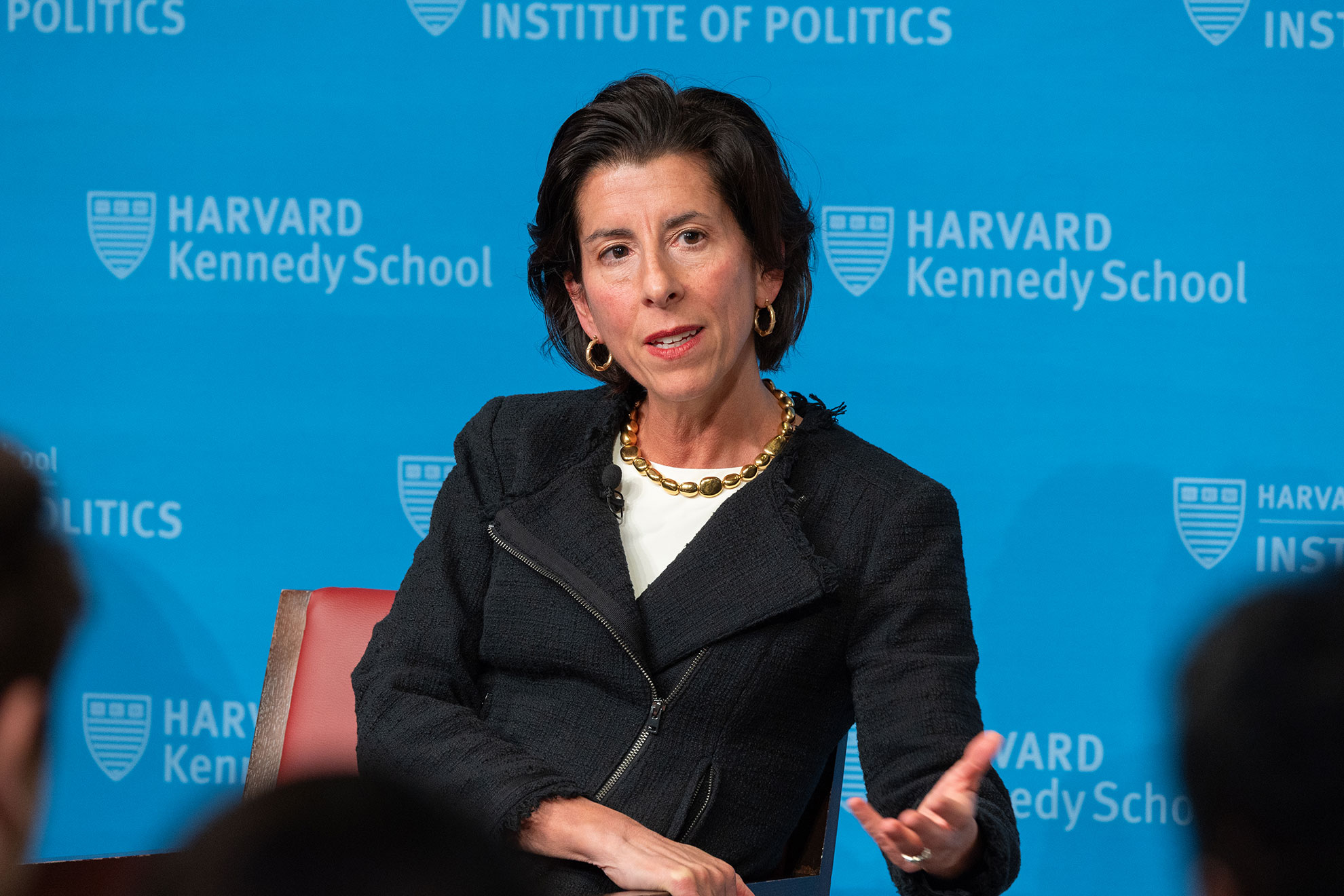In recent months, Gina Raimondo policy changes have sparked significant interest as she implements strategic reforms aimed at revitalizing the economy. Known for her tenure as Rhode Island’s governor, Raimondo has championed initiatives such as tax cuts and a minimum wage increase to support working families. Furthermore, she has prioritized infrastructure investment, focusing on modernizing critical facilities and transportation systems. Her strong background in supply chain management during her role as U.S. Commerce Secretary also plays a vital part in these policy shifts, ensuring a resilient economy. With a commitment to equitable growth and opportunity, Raimondo’s leadership is reshaping the economic landscape for the better.
Gina Raimondo’s recent policy reforms are making waves across the political and economic landscape. As a dynamic leader, she is pushing for beneficial shifts that include lowering taxes and raising the minimum wage to enhance the livelihoods of everyday Americans. Her focus on investing in infrastructure is crucial for fostering long-term economic growth, while her expertise in managing supply chains reflects a comprehensive approach to policy development. These actions signify a progressive mindset aimed at addressing the challenges faced by working individuals and families. Ultimately, Raimondo’s commitment to fostering an inclusive economy is poised to create a brighter future for all.
Gina Raimondo’s Innovative Economic Policies
Gina Raimondo’s tenure as a transformative leader highlighted her commitment to economic progress through innovative policies. As the former governor of Rhode Island and U.S. Commerce Secretary, she implemented a series of tax cuts that stimulated both business growth and job creation. By reducing the tax burden on state residents and businesses, Raimondo fostered an environment conducive to investment and entrepreneurship, demonstrating that sound fiscal policy can lead to sustainable economic growth. Her approach balanced these cuts with improvements in essential public services, ensuring that fiscal responsibility did not come at the cost of community welfare.
In addition to tax reductions, Raimondo aggressively pursued a minimum wage increase to support the working class in Rhode Island. Understanding that a living wage is essential for the health of the economy, she championed legislation that raised the minimum wage significantly during her time in office. This move was not merely symbolic; it reflected a broader commitment to ensuring that hard-working individuals could afford basic needs, driving consumer spending and fueling local businesses. Raimondo’s policies demonstrate a holistic view of economic health, combining fiscal prudence with social responsibility.
Infrastructure Investment as a Competitive Strategy
Gina Raimondo’s influence on infrastructure investment is a cornerstone of her policy agenda aimed at enhancing U.S. competitiveness. By advocating for the Infrastructure Investment and Jobs Act during her time with the Biden administration, she highlighted the critical need for a robust infrastructure system that can support economic growth. This act was not just a financial commitment; it represented a vision for a future where modernized transportation, utilities, and digital networks enable businesses to operate more efficiently and connect with global markets. Raimondo’s push for these investments underscores her understanding of the interconnectedness of infrastructure and economic health.
Moreover, Raimondo’s experience shows the importance of strategic infrastructure investment in maintaining America’s position in the global economy. By focusing on sectors such as renewable energy and advanced manufacturing, her policies aimed to position the U.S. as a leader in next-generation industries. This approach not only strengthens the domestic job market but also ensures that America can compete effectively against other countries investing heavily in similar sectors. By linking infrastructure improvements with technology advancements, Raimondo’s vision illustrates how modern economies can thrive through targeted investment.
Supply Chain Management and Economic Resilience
During her time as Commerce Secretary, Gina Raimondo faced significant challenges regarding supply chain disruptions exacerbated by the COVID-19 pandemic. Recognizing that a resilient supply chain is foundational to economic stability, she spearheaded initiatives to better understand and manage the complexities of these networks. The development of spreadsheets for critical supply chains, such as pharmaceuticals, exemplified her proactive approach to problem-solving. By identifying vulnerabilities and implementing strategies to address them, Raimondo helped ensure that essential goods remained available during a time of crisis.
Raimondo’s focus on international relationships further emphasizes the importance of collaboration in supply chain management. Under her leadership, initiatives were launched to foster partnerships with Southeast Asian countries, enhancing the U.S. supply chain robustness against potential disruptions. This geopolitical perspective is crucial; by building alliances and strengthening trade relationships, she positioned the U.S. to manage future supply chain challenges more effectively. Her efforts not only aimed at bolstering current economic conditions but also sought to create a more sustainable and resilient economic framework for the future.
Raimondo’s Approach to Labor Market Dynamics
Gina Raimondo’s policies have consistently recognized the significance of labor market dynamics in achieving economic growth. She understood that businesses thrive when there is a well-prepared workforce, leading her to advocate for child care solutions as part of labor market development. By pushing for policies that enable greater workforce participation, particularly among women, Raimondo aimed to alleviate barriers that inhibit workers from entering the labor force. Her forward-thinking strategies reflect an understanding that the labor market must be inclusive and equipped to meet modern demands.
Additionally, Raimondo’s emphasis on linking economic incentives with social programs demonstrates a nuanced approach to policy. She argued that supporting families through childcare initiatives is not merely a social program; such measures are essential for preparing the labor market for future needs. By ensuring that companies can access a diverse and well-supported workforce, her policies are designed to create a sustainable economic environment where businesses can flourish and families can thrive. This interconnected view of economic and social policy underscores Raimondo’s comprehensive approach to governance.
Addressing Inflation and Economic Recovery
Gina Raimondo’s time in the Biden administration coincided with unprecedented economic challenges, including rising inflation rates. In defending the administration’s stimulus act, she emphasized the necessity of robust financial support during the pandemic-induced downturn. As someone who had served as a governor during a crisis, Raimondo understood the weight of supporting citizens facing unemployment, demonstrating empathy and an acute awareness of economic realities. Her insights into managing public expectations during turbulent times highlight the delicate balance required in economic policymaking.
Raimondo also tackled the narrative surrounding the stimulus measures, arguing that while they contributed to inflation, they were crucial in preventing a deeper economic collapse. She advocated for a balanced view of economic recovery, emphasizing the importance of making smart investments that would yield long-term benefits. By highlighting the need for fiscal responsibility alongside immediate relief efforts, Gina Raimondo reinforced her role as a committed advocate for both short-term recovery and long-term economic stability.
Lessons Learned from Leadership Experience
Reflecting on her career, Gina Raimondo has candidly shared the lessons learned from her time in leadership positions. Acknowledging that politics is often a balancing act of ideals and practicalities, she has emphasized the importance of perseverance and adaptability in the face of challenges. Her willingness to own up to mistakes made during her tenure reveals a depth of character and an understanding that growth comes from both successes and shortcomings. This insight is particularly relevant in today’s political climate, where leaders are often scrutinized for every decision.
Moreover, Raimondo’s perspective on compromise illustrates her pragmatic approach to governance. In a divided political landscape, fostering bipartisan collaboration has been essential for passing effective legislation. Her experiences remind us that effective leadership often requires making tough choices and finding common ground to achieve meaningful outcomes. By sharing these lessons, she encourages future leaders to pursue progress with the understanding that politics can be a messy but necessary process.
Community Impact through Educational Initiatives
Gina Raimondo’s commitment to education has been a significant pillar of her policy initiatives, particularly her drive to make community college tuition-free. This bold move was aimed at improving access to higher education and equipping residents with the skills needed for today’s job market. By reducing financial barriers, she not only enhanced educational opportunities but also aimed to retain talent within Rhode Island, demonstrating a forward-thinking approach to local economic development. This initiative reflects a broader recognition of the role that education plays in fostering a knowledgeable and competitive workforce.
In addition to tuition initiatives, Raimondo has advocated for strong educational programs that address the needs of diverse communities. By linking educational opportunities with local economic needs, her policies ensure that community members can pursue careers that contribute to economic growth. These efforts highlight the understanding that investing in education is not just beneficial for individuals but is a strategic investment in a region’s economic future. Raimondo’s focus on education as a tool for empowerment underlines her vision of a more equitable society where every individual has the chance to succeed.
Challenges in Implementing Tax Reforms
Implementing tax reforms is often fraught with challenges, and Gina Raimondo faced her share during her tenure as governor. While pushing for tax cuts, she encountered resistance from various stakeholders worried about potential impacts on public services. Balancing the need for fiscal reductions with the responsibility to maintain essential services requires a nuanced approach to governance. Raimondo’s experience illustrates the complexities involved in tax reform, where not all constituents may share the same opinions on the benefits of reduced taxation.
Furthermore, Raimondo’s discussions on tax policies reflect an understanding of the broader economic impact of such decisions. She emphasized the need for thorough analysis and the importance of measuring outcomes after tax reforms are enacted. By advocating for data-driven policies, she has demonstrated a commitment to transparency and accountability in governance. Such efforts are crucial in gaining public trust and ensuring that tax reforms lead to the intended economic benefits.
Future of U.S. Economic Competitiveness under Raimondo’s Influence
Gina Raimondo’s influence on U.S. economic policy looks poised to shape future competitiveness significantly. Her ability to navigate complex economic landscapes and advocate for necessary reforms sets a precedent for addressing emerging challenges. As globalization and technological advancements continue to evolve, the policies initiated by Raimondo emphasize the imperative of adaptive response strategies. Her experiences suggest that future leaders will need to harness similar strategies to remain competitive on a global scale.
In conclusion, the legacy of Gina Raimondo’s policies will likely serve as a guide for upcoming economic strategists aiming to bolster the U.S. position in the global market. The interconnectedness of infrastructure investment, workforce development, and resilient supply chains demonstrates that success requires a multifaceted approach. By learning from her initiatives and the outcomes they produced, policymakers can craft solutions that address current economic obstacles while preparing for the evolving future.
Frequently Asked Questions
What are the key aspects of Gina Raimondo’s tax cuts during her tenure?
Gina Raimondo implemented consistent tax cuts throughout her governorship, aiming to relieve financial burdens on residents and stimulate economic growth in Rhode Island. Her approach was designed to create a more favorable business environment and improve disposable income for families.
How did Gina Raimondo approach minimum wage increase during her time as governor?
During her tenure, Gina Raimondo prioritized a minimum wage increase, advocating for higher wages to ensure that working-class families could achieve better living standards. This move was part of her larger strategy to enhance economic opportunity and support for everyday Americans.
What impact did Gina Raimondo’s infrastructure investment have on Rhode Island?
Gina Raimondo was instrumental in advocating for significant infrastructure investment, aligning with the Biden administration’s Infrastructure Investment and Jobs Act. Her efforts helped foster job creation, improve transportation systems, and enhance the overall quality of public services in Rhode Island.
Can you explain Gina Raimondo’s role in supply chain management during her time as Commerce secretary?
Gina Raimondo played a pivotal role in supply chain management, particularly during the COVID-19 pandemic. She worked on understanding and optimizing critical supply chains, ensuring that essential goods like pharmaceuticals were prioritized. Her initiatives aimed to boost domestic production and reduce reliance on foreign supplies.
What strategies did Gina Raimondo implement to enhance Rhode Island’s economy?
Gina Raimondo’s strategies to enhance Rhode Island’s economy included tax cuts, raising the minimum wage, making community college tuition free, and implementing infrastructure investments. These policies were designed to break down outdated practices and promote a more equitable economic landscape.
| Key Points |
|---|
| Gina Raimondo emphasizes the need for change to create positive outcomes, even if it means ‘breaking things’. This includes cutting taxes, raising the minimum wage, and making community college tuition-free. |
| During her tenure as Rhode Island’s governor, she cut 30% of state regulations. |
| Gina believes in advocating for the ‘little guy’ and ensuring fairness in policy changes. |
| As Commerce Secretary, she addressed supply chain issues during COVID-19 by building critical supply chain spreadsheets. |
| Under her guidance, the Biden administration formed relationships with countries like Indonesia and the Philippines to strengthen supply chain resilience. |
| She mentioned the CHIPs and Science Act, aiming to bolster domestic semiconductor manufacturing by 2030. |
| Raimondo noted the importance of fiscal responsibility, stating that private sector investments exceeded government expenditures. |
| She highlighted the need for fair trade practices, particularly in contrast to China’s subsidization of electric vehicles. |
| Raimondo acknowledged the complexities of politics and the balancing act required to achieve progress amidst a divided government. |
| She defended the size of the COVID stimulus package due to the unprecedented levels of unemployment and its necessity for economic recovery. |
| Raimondo argues for integrating child care plans into economic policies as a way to support labor markets and ensure access to workers. |
Summary
Gina Raimondo policy changes reflect her commitment to transformative governance that prioritizes equity and economic stability. By advocating for significant reforms such as tax cuts, wage increases, and educational accessibility, she demonstrates a willingness to challenge the status quo to benefit working-class Americans. Her proactive approach during the COVID-19 pandemic, particularly in improving supply chains and enhancing semiconductor production, showcases her strategic foresight in navigating complex economic environments. Overall, Raimondo’s policies signify her focus on creating a fair and prosperous future for all.



